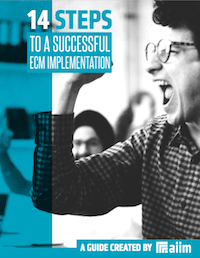The AIIM Blog
Keep your finger on the pulse of Intelligent Information Management with industry news, trends, and best practices.
Information Architecture | Information Governance | Intelligent Information Management (IIM)
We talk constantly about data access in information management. People need access to data. Systems should provide access. Access, access, access. But here's what we don't talk about enough: the actual user experience of getting to that data.
Share
Artificial Intelligence (AI) | Capture and Imaging | Compliance | Intelligent Document Processing | Intelligent Information Management (IIM)
Something interesting showed up in our recent 2025 AIIM Industry Watch report, and I can't stop wondering about it. When we looked at how practitioners view information management's future importance, we found a notable shift. In 2024, 72% of respondents believed IM would become more important in the next 12 months. In 2025, that number dropped to 48%. At first glance, that might look like a warning sign. I don't think it is.
Share

Making an ECM implementation successful requires planning and attention to detail. The best way to create the right solution is to identify organizational goals and priorities. Learn how to manage a successful implementation in our free guide.
Information Governance | Intelligent Information Management (IIM)
Strategic Questions for Information Professionals Information professionals today need to take a strategic approach by getting involved in their organization’s AI initiatives. This means proactively “inserting themselves” into developing the business case, defining the benefits, identifying the risks, planning for organizational change, etc. by asking questions:
Share
Document Management | Information Governance | Intelligent Information Management (IIM)
As information professionals, we're constantly asked to do more with less. More data to manage, more systems to navigate, more stakeholders to satisfy—all while working with limited resources. Sound familiar? Here's what I've learned after 15 years blending web development, archival expertise, and information management: the real value isn't in being an expert in just one domain. It's in the multidisciplinary nature of bringing multiple skill sets to the table.
Share
Artificial Intelligence (AI) | Intelligent Document Processing | Intelligent Information Management (IIM)
Earlier this week, I had the privilege of closing out the AI+IM Regional Exchange in Johannesburg, South Africa on February 3, 2026. Hosted by AIIM Training Partner COR Concepts and sponsored by Metrofile, this one-day intensive brought together 50+ practitioners to tackle the real challenges of AI data readiness, intelligent document processing, and information management strategy. Here are some of my key takeaways.
Share
Cloud | Information Security | Intelligent Information Management (IIM)
As information professionals navigate the rapidly evolving technological landscape, the democratization of technology — particularly cloud services — presents both opportunities and significant challenges. With AI accelerating this trend, it's more important than ever to approach technology decisions with a strategic mindset.
Share